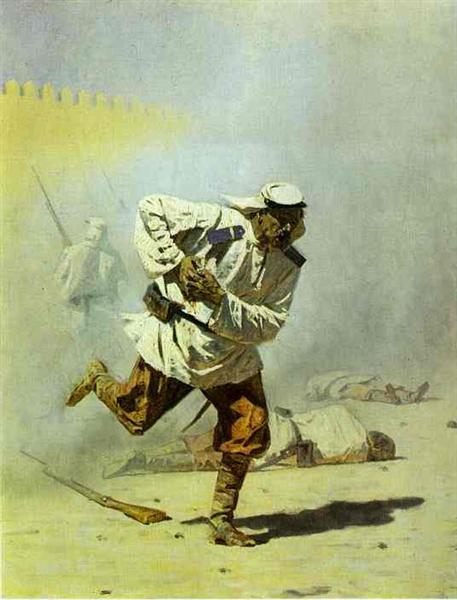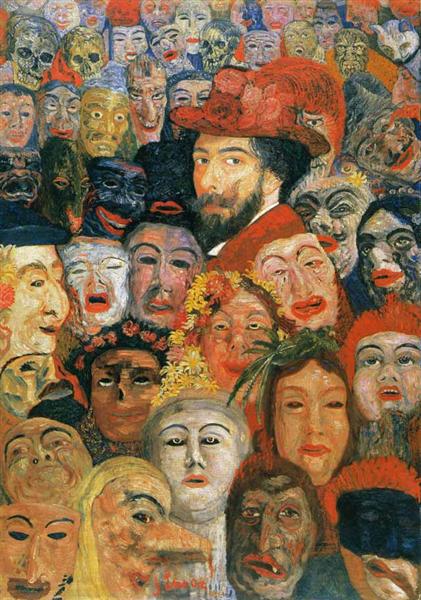Any discussion of emotion often quickly starts attributing value to some emotions or thoughts without realizing it. We are constantly monitoring our emotional states and our progress towards goals, and we work towards aligning these two so that they will not conflict. Despite this they often do, and because one of our biggest impediments to our goals is our own motivational tendencies, we can have valued attitudes towards our own emotion states. Our attempts to resist emotions and impulses and treating them as an enemy to some of our other goals is the topic of this discussion.
Often, we find ourselves suppressing a tendency to act when the moment is inappropriate. We resist the temptation to act impulsively and it feels as if we have caged a monster in a far too small enclosure. But since the release of that emotion would destroy our current goal commitment and ourselves along with it, we must keep it bottled. We make at least a momentary enemy out of our own thoughts and emotions because they can thwart whatever goal we are presently committed to.
In daily speech, we use the words suppression and repression almost interchangeably for this experience. The word repression seems to conjure the idea of unconscious thoughts that are far deeper and darker than those thoughts we aim to suppress. Suppression seems to do more with thoughts that come up that are unwanted, that are distracting more than anything else. The details on the differences are not really discussed beyond these facts. From the perspective that we are about to take, we will discover how they are different, both in what defines them and how we deal with them to ameliorate their negative effects.
Suppression and Bottling It Up
We know the feeling of suppression, the silencing of an emotional blast, the frantic covering of a leak that will soon burst. It is the pressure of an emotion, action, or thought that we bottle up because the situation is not right to express it. It is holding in a laugh when your boss makes a mistake, it is keeping from getting angry at your spouse after a frustrating day, it is maintaining a cool face when you have achieved something you are pleased with, it is a disturbing thought that we have no room for entertaining.

We know suppression very well, because it calls its attention to us, and it sometimes takes every ounce of our energy to resist those thoughts or impulses. A key characteristic of suppression is that whatever is being suppressed, is ok to think about or do in some situations, but in others it can result in disaster. You laugh regularly at the screwups your friends make, but when your hotheaded boss makes a similar blunder, your habit of laughing has to be suppressed. This is reminiscent of how operant conditioning requires situational context to know when an action will result in a reward or punishment. The emotion suppressed is basically a known habit, but requires a certain context.
This knowledge is what makes the suppression so conscious. We know the action we suppress and we have a good understanding of what would happen if we were to let slip the suppressed thought or action. To suppress something means to have a path for an action, but to know also that the occasion is not appropriate for it. Because suppressed actions are habitual in some contexts, it takes voluntary effort to resist them.
When we have a goal that we are working towards in the particular situation we are in (work, at home, in school), we align our behaviors according to those goals. Sometimes our extraneous habits can come to interfere, but we then treat those habits or emotions like an obstacle or threat to our current goal, and in our efforts to have voluntary or deliberate control over our lives, we resist. When we make the suppression of emotion the subgoal to our other goal commitment.
Repression of Threats to the Values of Goal Commitments
Repression, on the other hand, is very different. Despite the it sharing the same main characteristic of suppression, avoiding certain thoughts, emotions, or actions, these two have different outcomes and qualities.
Repression suggests thoughts and emotions and instincts which never come to consciousness, those that are far too dangerous to entertain in any situation. By its definition, the content of repressed thoughts is unconscious. There is no knowledge of what they would mean if they arose, for they contain great potential for threat, but the extent is unknown. The reason being is that repressed thoughts or actions (if we can even call them that), are pieces of potential knowledge that may undermine one’s sense of self.

To undermine the self, means to undermine one’s commitment to a higher goal. The self is defined as the accumulation of goal commitments, and the higher order the commitment (the more life one puts into it) the harder the walls that protect its value must be. If one is committed to being a good person, one represses the behaviors that undermine it, that desire to do evil things. Someone like this could not imagine him or herself with the potential to or even desire of committing something heinous, even if one were to be well on their way to doing that. That is why repressed thought are totally unconscious. There are no circumstances in which one could think such a thing without it tearing a hole in one’s motivational world.
This is very different from suppression. Suppressed thoughts force themselves into consciousness and repressed thoughts never emerge, except in rare and usually traumatic experiences. To suppress something is to have a goal and discover the thought and impulses that are obstacles to the goal. We consciously make the effort to suppress the thought, as a subgoal to another goal. Something that is repressed has no place in the process of goal striving. Repressed information is a threat to the value of the goal itself; it is incompatible with having the goal. To know that desire, emotion, or impulse is to have to rethink the way one has always been living.
When Sigmund Freud studied repression in his patients it was clear to him that most repressed thoughts are violent or sexual in nature. Both of these have strict rules in most civilizations, and that means that they become incompatible with many of our higher goals. Thoughts having to do with the possible perversions of these instincts are so severely threatening to us that we cannot even think them. Instead, according to Freud, those impulses find their way to express themselves is very guarded ways. For instance, repressed thoughts of violence towards a spouse could tear apart the value of the high ideal of being a good spouse, a goal which you have committed much of your life to achieving. These thoughts are outside our world of contemplation and knowledge. They would be traumatizing if encountered fully, while suppressed thoughts are merely frustrating.

Ego Defenses Play Two Differing Roles
With both of these ways of avoiding thoughts and impulses, we ought to find out in what ways to we treat them differently. Another thing they have in common is that they use similar tools to avoid thoughts. “Ego defenses,” coined by Anna Freud, are what people do to transform one thought or action into another without the full force of the negative effects of that thought. Some of these include, projection of emotion onto another object, avoiding situations where the thought or action might occur, or outright denial of the validity of the thought or information.
In suppression, the ego defenses are tools of emotional regulation and can help you to achieve goals. However, in repression, the ego defense mechanisms are the walls past which we cannot see, shielding us from threatening but potentially important features about our emotional and motivational lives. If it is repression that is using those defenses to keep us blind to something, noticing a manifesting ego defense should be a sign that you may want to cautiously look deeper. As Freud and the psychoanalysts attempt to do. The repressed thought protects the goal commitments we have, and so we must look at these ego defenses with the awareness that a large part of our identity can be lost when we do so.



